In 2024, a user’s expectation for personalization goes above and beyond.
Especially for a mobile-first audience.

Global mobile phone users were estimated to be 6.8 billion in 2023 and will only grow from here. This is why ensuring the highest level of personalization is imperative.
It not only gives you an edge over your competitors but also is a way to skyrocket your revenue. It’s the difference between a generic experience and a personalized one, where users feel seen, understood, and valued.
Introducing WebEngage’s App Personalization
Divided into in-line and in-app personalization, WebEngage provides a holistic way to contextualize messages that increase engagement and drive revenue. Backed by real-time user insights and powerful features, you are bound to create memorable experiences for your users each time!
What features does WebEngage’s App Personalization have? How can you use them? What are the benefits? This blog will answer all for you.
Why You Need App Personalization:
The need for app personalization stems from the evolving expectations of today’s users. In an era where attention spans are limited, and choices are abundant, delivering generic experiences may result in users quickly losing interest or abandoning an app altogether. Here are key reasons why app personalization is essential:
- Enhanced User Engagement: Personalized experiences capture and maintain user attention by showcasing content and features that are specifically relevant to them. This not only increases the time users spend within the app but also fosters a deeper connection with the brand.
- Improved User Retention: Users are likelier to stick around when they feel an app understands their preferences and caters to their needs. Personalization reduces churn rates and increases each user’s lifetime value.
- Increased Conversions: Whether it’s making a purchase, signing up for a subscription, or completing a specific action within the app, personalized experiences can significantly impact conversion rates. Businesses can drive desired actions and achieve their goals by offering users tailored recommendations and incentives.
1. What is the difference between In-App and In-Line?
In-App:
In-app personalization is centered around tailoring content either as pop-ups or within-the-app elements that can be dismissed post-action taken by the user or after a specific time.
For Instance: For a travel app using WebEngage, you can showcase personalized pop-ups suggesting upcoming beach destinations that align with the user’s past travel choices.
In-Line:
In-line personalization focuses on customizing content and elements directly within the user interface or the app screen.
For Instance: An e-commerce app leveraging WebEngage can implement in-line personalization to send targeted communication during flash sales or promotional events.
2. What does the difference look like?
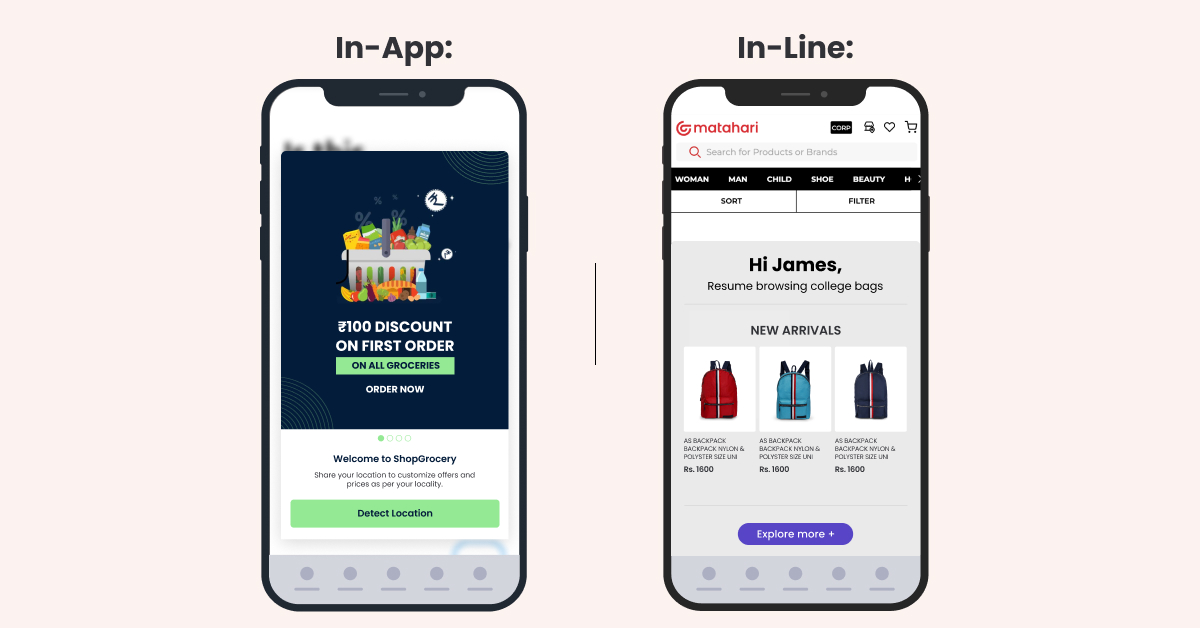
Breaking down In-App Personalization
At WebEngage, we have made it easy for you to personalize all your campaigns by leveraging real-time data points related to your user’s preferences and behavior. These data points are referred to as User Attributes and Events, respectively, and make it possible for you to deliver tailored experiences at scale.
Thus, the first step is to get all these User Attributes and Events flowing into your WebEngage account from your app. Learn more about setting up campaigns here.
WebEngage Features: WebEngage allows businesses to dynamically adjust the app’s interface, content, and features, in-app messages and pop-ups delivered based on user preferences and behaviors.
Layout options for in-app:

Use cases for your business using in-app personalization:
- Feedback and survey: (For Travel/OTA/Hospitality)
- Target Audience: Users who’ve completed a stay or booked a trip with the app.
- Brief: Nudge users within the app to provide feedback & reviews to further improve user experience. Personalize follow-ups based on booking & travel experience.
- Impact: Gather user data to measure NPS, provide loyalty benefits, discount coupons and more.
- Dynamic In-Game Challenges: (For Gaming)
- Target Audience: Users who actively engage in the app.
- Brief: Deliver a personalized gaming experience that evolves with each player’s unique journey. Design personalized challenges, adjusting difficulty levels, rewards, and objectives based on the user’s gaming history, skill level, and preferences.
- Impact: An immersive gaming experience that drives user loyalty.
- Medication Reminders and Education: (For Healthcare)
- Target Audience: Users with specific prescription needs or seeking health education.
- Brief: Send medication reminders tailored to the user’s prescription schedule. Integrate educational content about medications, potential side effects, and lifestyle tips personalized to the user’s health condition and medical history.
- Impact: Increased user trust in the healthcare app, leading to user satisfaction.



Breaking down In-Line Personalization
In-line personalization allows you to create display ads that will look native to the app and run personalized campaigns on the app to help achieve their use cases without hindering the end user’s experience.
WebEngage Features: The advantages of WebEngage’s app in-line personalization are that you can update creatives without sending an app update, dynamically update home page cards, cross-sell/upsell with products, send carousel campaigns, and enable geolocation personalization as well.
Layout options for in-line:
- Text Layout:
- Banner Layout:
- Custom View Layout:
Developers can leverage a card structure focused on textual content. This format supports basic styling, including buttons and icons for enhanced interactivity.
For a more visually engaging experience, developers can opt for a card layout enriched with images. This banner option supports basic styling and allows the integration of buttons
The custom view layout option provides the utmost flexibility, allowing you to create your own layouts, and enabling you to explore your creativity as much as possible, while WebEngage provides you with personalized data.
Please note: There will be an option to edit layouts. Users can also add multiple layout variations—contact product@webengage.com for any further layout options you might want to explore.
Use cases for your business using in-line personalization:
- Personalized Shopping Cart Discounts: (For E-Commerce)
- Target Audience: Users with items in their shopping carts.
- Brief: Dynamically present personalized shopping cart discounts at the checkout stage. Employ on-page elements or banners to showcase exclusive offers tailored to the user’s past purchases, encouraging swift and satisfying transaction completion.
- Impact: A frictionless user experience and better conversion rates.
- Personalized Investment Portfolios: (For BFSI/Fintech)
- Target Audience: Users engaging in financial activities on the app.
- Brief: Deliver user-specific investment portfolio recommendations through the app interface that seamlessly adjusts to the user’s risk tolerance, financial goals, and investment history. This empowers the user to make more informed investment choices.
- Impact: Informed decision-making, elevating customer satisfaction

- Course Recommendations Based on Learning Style: (For edtech)
- Target Audience: All users
- Brief: Integrate in-line personalization to recommend courses based on individual learning styles. Utilize banners or other on-page elements to suggest courses aligned with the user’s learning preferences.
- Impact: Improved user interactions and learning outcomes.


Statistics you must track using WebEngage’s App Personalization:
- Clicks on Cards and Buttons:
- Conversions:
- Revenue from User Interactions:
- Clicks on Engagements:
- Impressions (Including Default Content Views):
Track clicks on visually enriched card elements and actionable buttons to evaluate user engagement with different interactive elements within the app.
Monitor instances of user conversions, such as purchases or sign-ups, to understand the effectiveness of conversion strategies and user behavior.
Measure revenue explicitly generated from user interactions, including card and button clicks, tying engagement efforts directly to financial outcomes.
Evaluate the overall engagement level by tracking the total number of clicks on various interactive elements within the app, providing insights into popular features.
Assess impressions of content views, including default views presented to users, for a comprehensive understanding of user engagement with personalized and default content.
Conclusion
Today, standing out and fostering lasting connections with users is paramount.
By integrating app personalization strategies, businesses unlock the door to unparalleled user engagement, increased conversions, and, ultimately, sustainable revenue growth.
Take the leap into the future of your app personalization with WebEngage. Book a demo with our experts to witness the full potential of app personalization.
Your personalized app experience awaits – let’s create it, refine it, and make it uniquely yours.



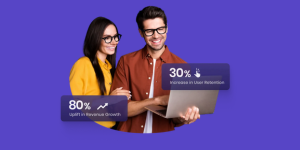
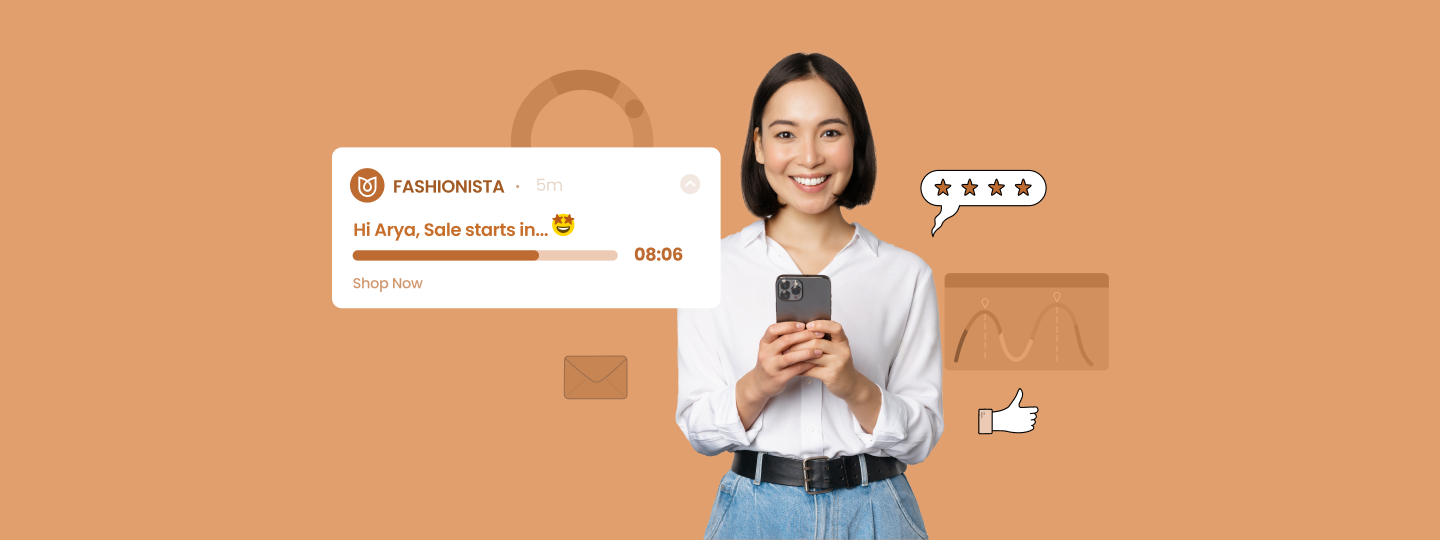

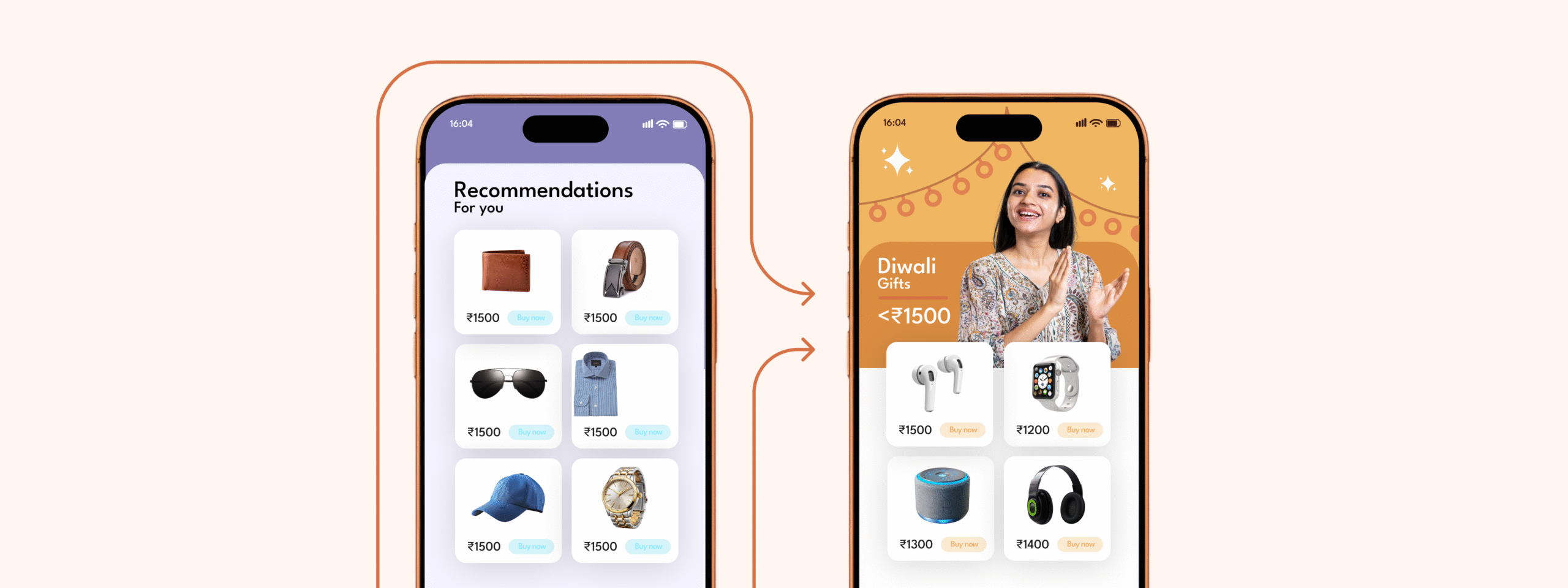
 Anmol Mewada
Anmol Mewada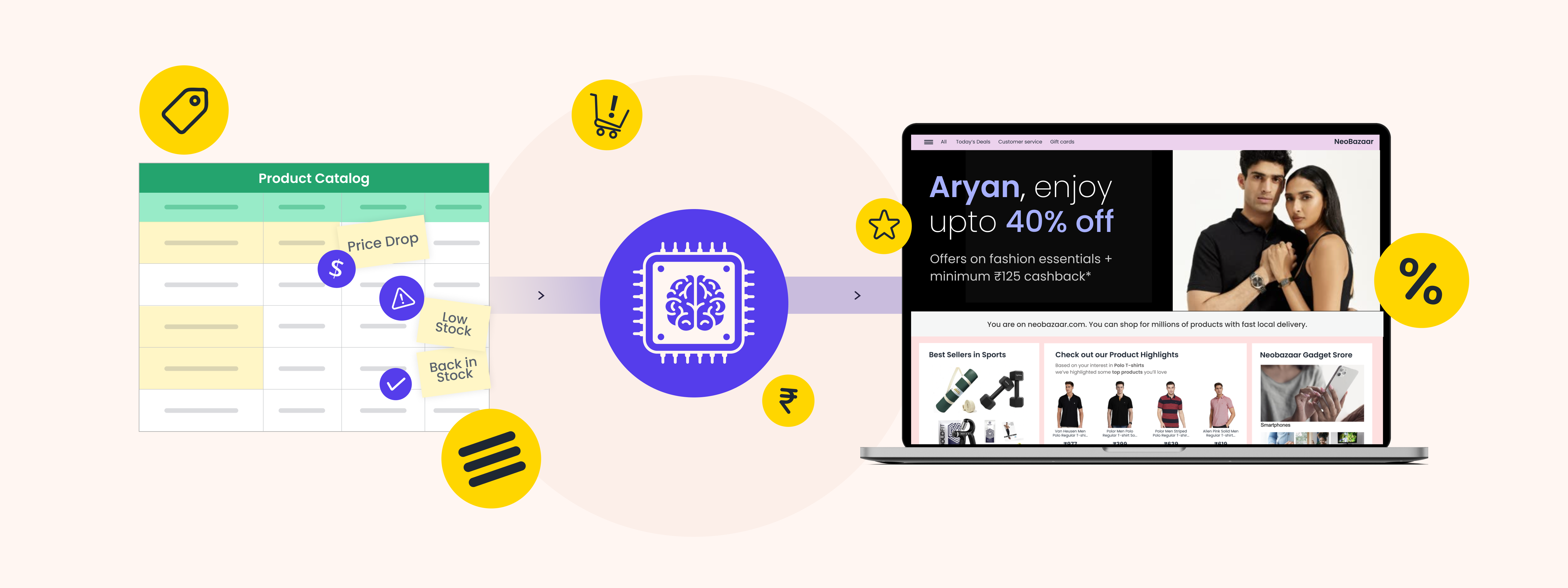
 Manoj Chawda
Manoj Chawda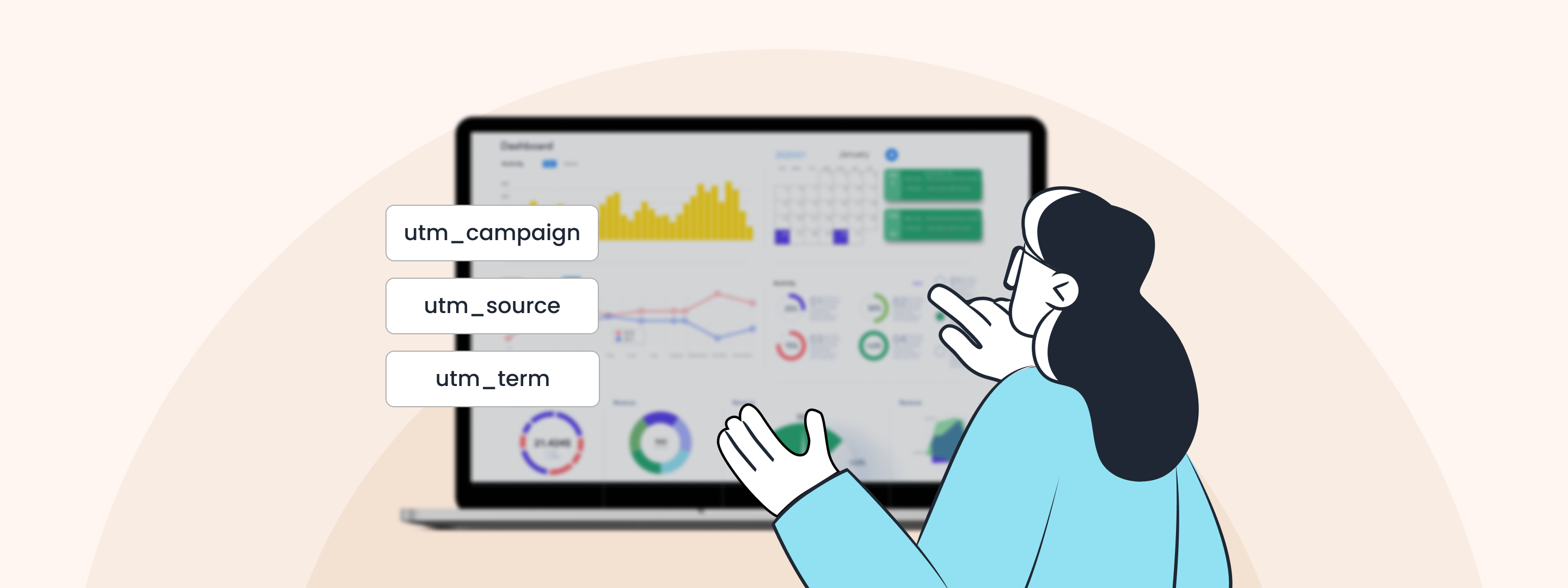
 Ananya Nigam
Ananya Nigam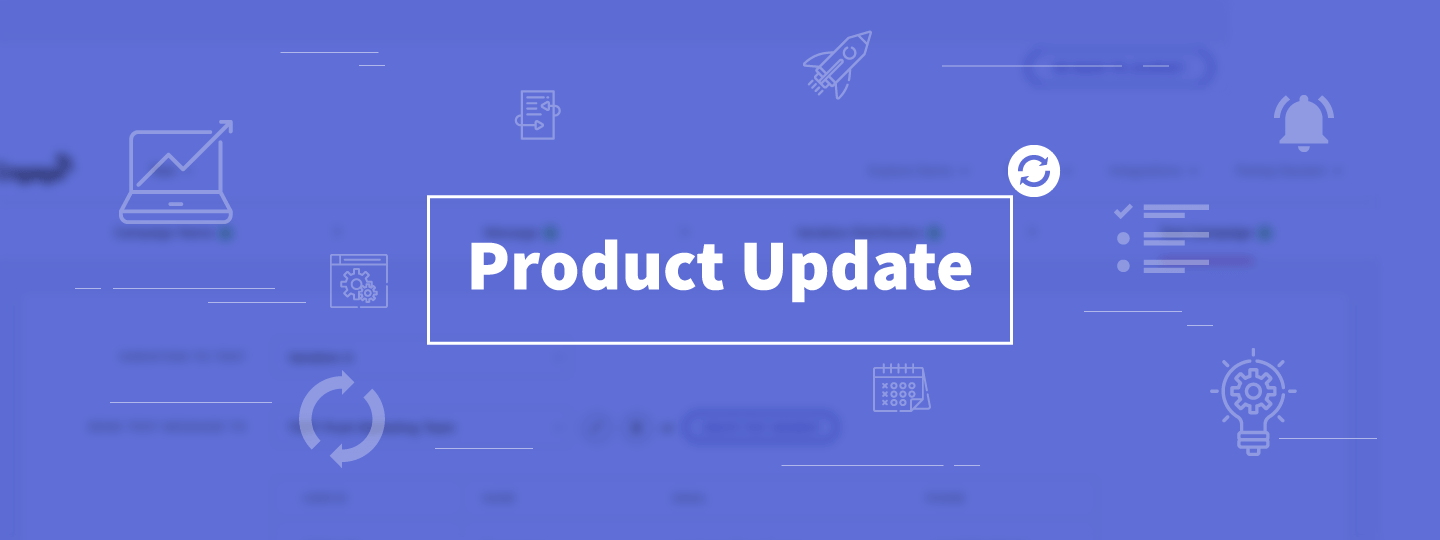
 Harshita Lal
Harshita Lal